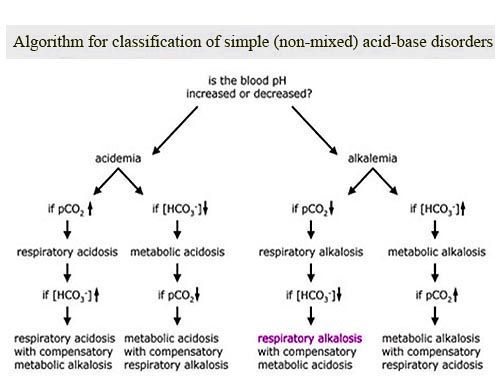Respiratory alkalosis

Published: 18 Jun 2025
ICD9: 276.3 ICD10: E87.3 ICD11: 5C74
Respiratory alkalosis is a condition where the blood becomes too alkaline (high pH) due to excessive exhalation of carbon dioxide (CO2) from the lungs.
Here's a breakdown:
![]() Alkalosis: Refers to a condition where the blood pH is higher than normal (above 7.45).
Alkalosis: Refers to a condition where the blood pH is higher than normal (above 7.45).
![]() Respiratory: Indicates that the problem originates in the respiratory system, specifically with breathing and CO2 elimination.
Respiratory: Indicates that the problem originates in the respiratory system, specifically with breathing and CO2 elimination.
![]() CO2 and Acidity: CO2 is a waste product of metabolism. When dissolved in blood, it forms carbonic acid (H2CO3). Therefore, CO2 acts as an acid in the body.
CO2 and Acidity: CO2 is a waste product of metabolism. When dissolved in blood, it forms carbonic acid (H2CO3). Therefore, CO2 acts as an acid in the body.
In simple terms, you're breathing out CO2 faster than your body is producing it, leading to a decrease in the acid (CO2) in your blood and a rise in pH.
Causes of Respiratory Alkalosis:
The most common cause is hyperventilation (breathing too fast and/or too deeply). Other causes include:
![]() Hyperventilation:
Hyperventilation:![]()

![]() Anxiety/Panic Attacks: This is the most common cause.
Anxiety/Panic Attacks: This is the most common cause.![]()

![]() Pain: Severe pain can trigger rapid breathing.
Pain: Severe pain can trigger rapid breathing.![]()

![]() Fever: Increased body temperature can lead to faster breathing.
Fever: Increased body temperature can lead to faster breathing.![]()

![]() High Altitude: Low oxygen levels at high altitudes stimulate breathing.
High Altitude: Low oxygen levels at high altitudes stimulate breathing.![]()

![]() Pulmonary Embolism: A blood clot in the lungs can cause rapid breathing.
Pulmonary Embolism: A blood clot in the lungs can cause rapid breathing.![]()

![]() Asthma/COPD exacerbation: Though less common, rapid breathing can occur.
Asthma/COPD exacerbation: Though less common, rapid breathing can occur.![]()

![]() Pregnancy: Hormonal changes can stimulate breathing.
Pregnancy: Hormonal changes can stimulate breathing.![]()

![]() Central Nervous System Disorders: Conditions like stroke or brain injury can affect breathing patterns.
Central Nervous System Disorders: Conditions like stroke or brain injury can affect breathing patterns.![]()

![]() Sepsis: Severe infection can lead to hyperventilation.
Sepsis: Severe infection can lead to hyperventilation.![]()

![]() Mechanical Ventilation: Overly aggressive ventilator settings.
Mechanical Ventilation: Overly aggressive ventilator settings.![]()

![]() Salicylate poisoning (e.g., aspirin overdose): Stimulates the respiratory center.
Salicylate poisoning (e.g., aspirin overdose): Stimulates the respiratory center.
Symptoms of Respiratory Alkalosis:
Symptoms can vary depending on the severity and how quickly the condition develops. They can include:
![]() Lightheadedness
Lightheadedness
![]() Dizziness
Dizziness
![]() Confusion
Confusion
![]() Shortness of Breath
Shortness of Breath
![]() Rapid Heart Rate
Rapid Heart Rate
![]() Numbness and Tingling (especially in the fingers, toes, and around the mouth)
Numbness and Tingling (especially in the fingers, toes, and around the mouth)
![]() Muscle Spasms or Cramps
Muscle Spasms or Cramps
![]() Chest Pain
Chest Pain
![]() Seizures (in severe cases)
Seizures (in severe cases)
Diagnosis:
![]() Arterial Blood Gas (ABG): This is the key diagnostic test. An ABG will show:
Arterial Blood Gas (ABG): This is the key diagnostic test. An ABG will show:![]()

![]() High pH (above 7.45)
High pH (above 7.45)![]()

![]() Low PaCO2 (partial pressure of carbon dioxide, below 35 mmHg)
Low PaCO2 (partial pressure of carbon dioxide, below 35 mmHg)![]()

![]() Bicarbonate (HCO3-) levels may be normal initially, but will decrease over time in chronic respiratory alkalosis as the kidneys compensate.
Bicarbonate (HCO3-) levels may be normal initially, but will decrease over time in chronic respiratory alkalosis as the kidneys compensate.
Treatment:
Treatment focuses on addressing the underlying cause. For example:
![]() Anxiety/Panic Attacks: Breathing exercises (like pursed-lip breathing or breathing into a paper bag - *though breathing into a paper bag is now generally discouraged unless medical guidance is available, as it can lead to hypoxia in some cases*) and addressing the underlying anxiety.
Anxiety/Panic Attacks: Breathing exercises (like pursed-lip breathing or breathing into a paper bag - *though breathing into a paper bag is now generally discouraged unless medical guidance is available, as it can lead to hypoxia in some cases*) and addressing the underlying anxiety.
![]() Pain: Pain management.
Pain: Pain management.
![]() High Altitude: Descending to a lower altitude.
High Altitude: Descending to a lower altitude.
![]() Pulmonary Embolism: Anticoagulants and potentially thrombolytic therapy.
Pulmonary Embolism: Anticoagulants and potentially thrombolytic therapy.
![]() Mechanical Ventilation: Adjusting ventilator settings.
Mechanical Ventilation: Adjusting ventilator settings.
![]() Sepsis: Treating the underlying infection.
Sepsis: Treating the underlying infection.
Important Considerations:
![]() Chronic vs. Acute: Respiratory alkalosis can be acute (sudden onset) or chronic (long-term). Chronic respiratory alkalosis allows the kidneys time to compensate by excreting bicarbonate, so the pH may be closer to normal.
Chronic vs. Acute: Respiratory alkalosis can be acute (sudden onset) or chronic (long-term). Chronic respiratory alkalosis allows the kidneys time to compensate by excreting bicarbonate, so the pH may be closer to normal.
![]() Compensation: The body tries to compensate for respiratory alkalosis by decreasing bicarbonate levels in the blood (metabolic compensation).
Compensation: The body tries to compensate for respiratory alkalosis by decreasing bicarbonate levels in the blood (metabolic compensation).
![]() Severity: Severe respiratory alkalosis can be life-threatening and requires immediate medical attention.
Severity: Severe respiratory alkalosis can be life-threatening and requires immediate medical attention.
Disclaimer: This information is for general knowledge and informational purposes only, and does not constitute medical advice. It is essential to consult with a qualified healthcare professional for any health concerns or before making any decisions related to your health or treatment.